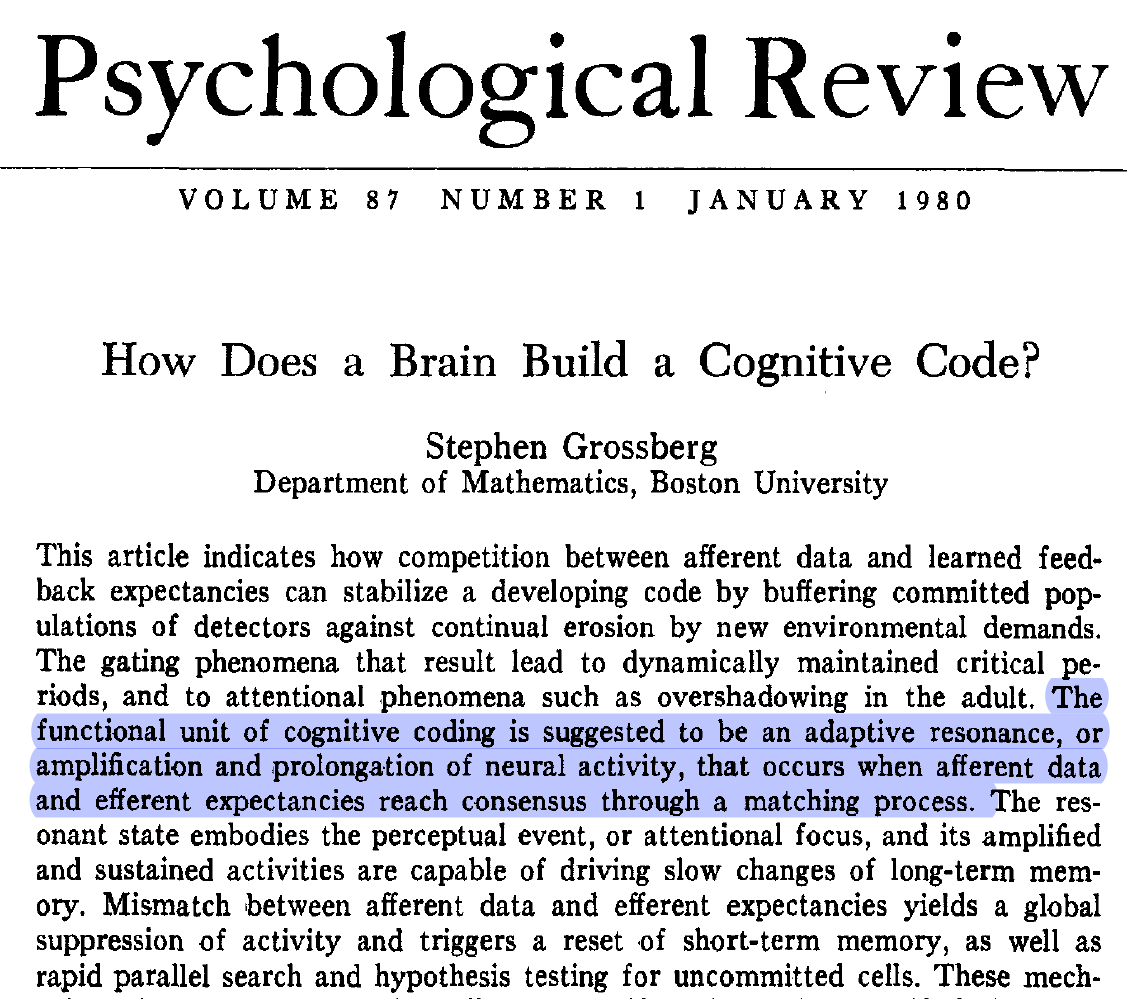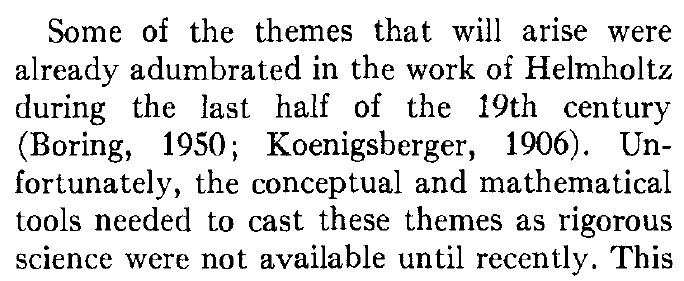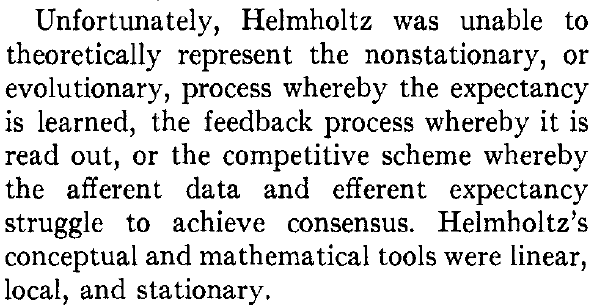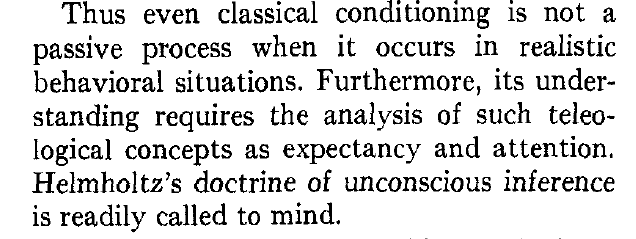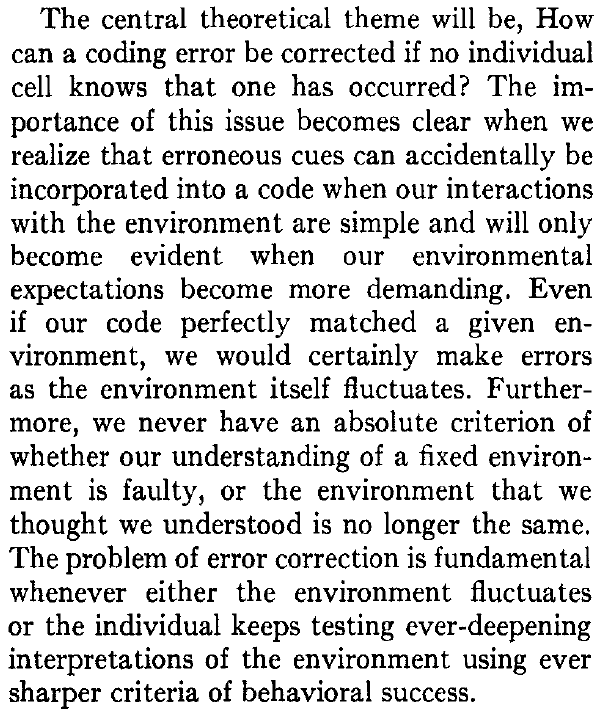4) P. 3: "In more modern terms, sensory data activate a
feedback process whereby a learned template,
or expectancy, deforms the sensory data until a
consensus is reached between what the data
"are" and what we" expect" them to be. Only
then do we "perceive" anything."
feedback process whereby a learned template,
or expectancy, deforms the sensory data until a
consensus is reached between what the data
"are" and what we" expect" them to be. Only
then do we "perceive" anything."
5) He then explains why *expectations* are needed from an "evolutionary rationale":
"The struggle between raw data and learned
expectations also has an evolutionary rationale.
If perceptual and cognitive codes are defined
by representations that are spread across many
cells...
"The struggle between raw data and learned
expectations also has an evolutionary rationale.
If perceptual and cognitive codes are defined
by representations that are spread across many
cells...
...with no single cell knowing the behavioral
meaning of the code, then some buffering
mechanism is needed to prevent previously
established codes from being eroded by the
flux of experience. It will be shown below how
feedback expectancies establish such a buffer."
meaning of the code, then some buffering
mechanism is needed to prevent previously
established codes from being eroded by the
flux of experience. It will be shown below how
feedback expectancies establish such a buffer."
7) P.3:
"One of the facts that we must face
about evolutionary systems is that their simple
organizational principles can imply extraordinarily
subtle properties. Indeed, part of the dilemma that many students of mind now face is not that they do not know enough facts on which...
"One of the facts that we must face
about evolutionary systems is that their simple
organizational principles can imply extraordinarily
subtle properties. Indeed, part of the dilemma that many students of mind now face is not that they do not know enough facts on which...
8)
... to base a theory, but rather
they do not know which facts are principles
and which are epiphenomena, and how to
derive the multitudinous consequences that
occur when a few principles act together. A
rigorous theory is indispensable for drawing
such conclusions."
... to base a theory, but rather
they do not know which facts are principles
and which are epiphenomena, and how to
derive the multitudinous consequences that
occur when a few principles act together. A
rigorous theory is indispensable for drawing
such conclusions."
Something that Steve always emphasizes even about "simple conditioning phenomena":
"even classical conditioning is
often only one component of a multicomponent
process in which attention, expectation, and
other "higher order" feedback processes play
an important role" (p. 3).
"even classical conditioning is
often only one component of a multicomponent
process in which attention, expectation, and
other "higher order" feedback processes play
an important role" (p. 3).
10) So phenomena like "blocking" in conditioning offer huge clues to understand the nature of the "predictive brain":
"Thus many learners are minimal adaptive
predictors. If a given set of cues is followed
by expected consequences, then all other cues
are treated as irrelevant"
"Thus many learners are minimal adaptive
predictors. If a given set of cues is followed
by expected consequences, then all other cues
are treated as irrelevant"
11) And here comes a monumental step in my opinion (p. 4): "Several important qualitative conclusions
can be drawn from these remarks. First, what
is conditioned depends on our expectations,
and these in turn help to regulate the cues to
which we pay attention. "
can be drawn from these remarks. First, what
is conditioned depends on our expectations,
and these in turn help to regulate the cues to
which we pay attention. "
12) "Second, cues are conditioned, and indeed codes that interrelate these cues are built up, only if we pay attention
to these cues because of their potential informativeness."
to these cues because of their potential informativeness."
"Third, the mismatch between expected consequences and real events occurs only after attention has been focused on certain cues that thereupon generate the
expectancy. Somehow this mismatch "feeds backwards in time" to amplify cues that have previously been overshadowed but that
expectancy. Somehow this mismatch "feeds backwards in time" to amplify cues that have previously been overshadowed but that
...must have contained relevant information that we
have erroneously ignored. Fourth, whenever we
are faced with unexpected consequences, we
do not know which cues have erroneously been
ignored. The feedback process must be capable
of amplifying all of the cues that are still...
have erroneously ignored. Fourth, whenever we
are faced with unexpected consequences, we
do not know which cues have erroneously been
ignored. The feedback process must be capable
of amplifying all of the cues that are still...
...being stored, albeit in a suppressed state. In
other words, the feedback process is nonspecific.
Finally, the nonspecific feedback
process that is elicited by unexpected events
competes with the specific consummatory
channels that have focused our attention on
the wrong set...
other words, the feedback process is nonspecific.
Finally, the nonspecific feedback
process that is elicited by unexpected events
competes with the specific consummatory
channels that have focused our attention on
the wrong set...
of cues. This competition between
specific and nonspecific mechanisms helps us
to reorganize our attentional focus until
expected consequences are once again achieved."
specific and nonspecific mechanisms helps us
to reorganize our attentional focus until
expected consequences are once again achieved."
18) Recall that this is 1980 when the role of attention, which we find so central now, was very poorly understood. He goes on to say:
"Perhaps for this reason the fact that attentional variables can significantly influence what codes will be learned seems to have been ignored...
"Perhaps for this reason the fact that attentional variables can significantly influence what codes will be learned seems to have been ignored...
19) by some neurophysiologists who study the development of the visual cortex."
Interesting here to note that he greatly influenced Bob Desimone who went on to have major contributions in neurophysiology with ideas of "biased competition".
Interesting here to note that he greatly influenced Bob Desimone who went on to have major contributions in neurophysiology with ideas of "biased competition".
20) On p. 7 Steve explains his key concept of "minimal architectures":
"...the minimal structure
capable of achieving our ends will be defined.
This procedure will clarify what mathematical
problems have to be solved, what their
relationship is to each other, and what types
of...
"...the minimal structure
capable of achieving our ends will be defined.
This procedure will clarify what mathematical
problems have to be solved, what their
relationship is to each other, and what types
of...
21)
... thematic variations on the minimal structures
can be anticipated in different species
and different neural locations in the same
individual."
... thematic variations on the minimal structures
can be anticipated in different species
and different neural locations in the same
individual."

 Read on Twitter
Read on Twitter